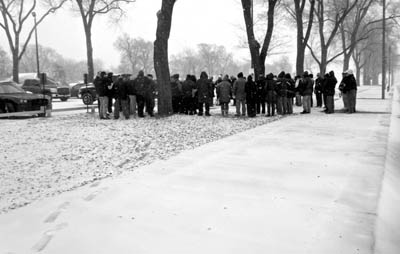Today’s post is written by guest blogger Michael K. Potter, teaching and learning specialist in the UWindsor Centre for Teaching and Learning. Michael blogs regularly at Better Living Through Pedagogy.
The 2010 UWindsor campus December 6th memorial will begin at 4pm in the CAW Student Centre Commons, move to the memorial outdoors, and end in Ambassador Auditorium.
December 6th has been designated our National Day of Remembrance and Action on Violence against Women. It’s meant to honour the memories of the 14 women killed in the 1989 Ecole Polytechnique Massacre. They were killed by a misogynistic man for simply being women.

photo by Elaine Weeks, Walkerville Publishing, elaine@walkerville.com, 519-255-9898. Location Drouillard Road south of Tecumseh Road opposite Chrysler Plant, Windsor
While this occasion is inescapably a somber event, it also provides an opportunity for all members of the broader university community across Canada to think and talk about how what we can do to prevent acts of violence – against women, certainly, but also against men and children as well. But thought is useless until discharged in action, as William James taught us a century ago. We need to move from contemplation to the more difficult, and more important, task of changing behaviour.
Most people now think of universities as institutions that exist to teach students facts, beliefs, theories, and skills they need to become productive in their careers, to function as educated members of society, or to contribute to the broader social good. While there’s important truth in such conceptions, they leave out something very important: cognitive and performative learning is useless, even counterproductive, unless integrated with affective learning.
One of the purposes of a university, I believe, is to help students develop their affective knowledge, that is, to learn the values and attitudes that will motivate them to use their other knowledge in ways that benefit themselves and others. There is a moral dimension to a complete education that we cannot, as responsible teachers, ignore.
Although there is a lot of diversity in attitudes and values between people, cultures, and nations, we all have more in common than we realize. Very few people in the world who are not noticeably impaired will eschew such pro-social values as honesty, beneficence (doing good for others), non-maleficence (not harming others), and responsibility (fulfilling our obligations). These values, and some others, are universal, though people may quarrel about which particular decisions and behaviours are implied by them in some circumstances.
A society that tolerates violence against women – or any group of persons – is not a society that could be acceptable to even a slim majority of the population. There are no desirable ends associated with it. No defensible arguments can be created in its favour. So, accepting that, how do our classes, our programs, all of the activities that comprise our teaching contribute to the development of students whose values and attitudes prohibit violence? How are we – all of us – contributing to the development of a society that refuses to accept violence, whose members work actively against it?
I believe every university program, every course, and every teacher can contribute to a more pro-social world in some way. So: why not share your ideas below? What have you done to help students learn pro-social values? What could you do? How could you play a role in creating a society in which an event like the Ecole Polytechnique Massacre would be inconceivable?



Recent Comments